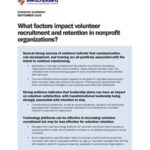and retention of employees. However, there are few studies on the effects of leadership styles on volunteers. This study aims to investigate the possible influence of transformational leadership style on retention of volunteers. Our first hypothesis is that if a volunteer coordinator has a transformational leadership style, there is a higher intention to remain. Our second hypothesis is that this relationship is mediated by the variables of the three-stage model of volunteers’ duration of service (satisfaction, organizational commitment, and role identity). To test these hypotheses, a sample of 417 volunteers (73% women), from 17 non-profit organizations, with an average age of 44 years, was surveyed. Joint results of a multiple regression analysis and path analysis supported the proposed model (CFI, GFI and NFI = .99, RMSEA < .06). Results indicate that when volunteer coordinators have a transformational style, volunteers have a higher intention to remain and that this relationship between transformational leadership style and intention to remain is partially mediated by satisfaction, organizational commitment, and role identity. The results seem to indicate that a useful strategy when running programs to increase the retention of volunteers is to train their coordinators in transformational leadership skills.
A Systematic Review on the Impact of Trauma-Informed Education Programs on Academic and Academic-Related Functioning for Students Who Have Experienced Childhood Adversity
The purpose of this study was to conduct a systematic review of the existing literature regarding trauma-informed education programs and their impact on academic and academic-related outcomes. The articles included for review (n=15) contained data on trauma-informed education programs implemented in preschool, primary/elementary, and high school settings. Academic and academic-related outcomes reported included attendance, disciplinary…

